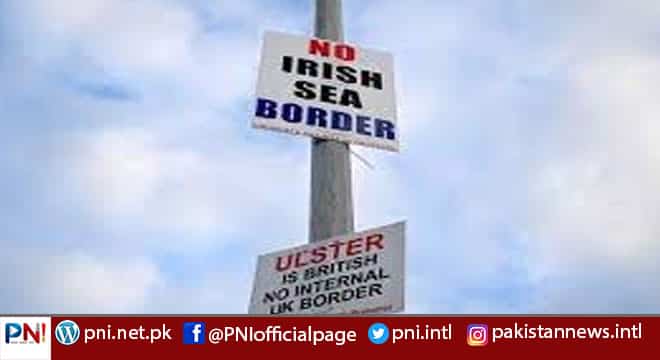Belfast, Dec 8 (AFP/APP):The Northern Ireland Protocol was signed separately from the Brexit trade deal between the UK and the European Union and aims to avoid a “hard” border on the island of Ireland.
Physical infrastructure on the border between the province and EU member state Ireland was a regular flashpoint during three decades of violence over British rule in Northern Ireland.
Removing customs posts and allowing the free movement of goods and people between the north and south was a key part of the 1998 Good Friday Agreement that brought peace.
But it has complicated the post-Brexit situation.
To keep the border open, Northern Ireland is effectively still in the European single market — but checks are required on goods heading east-west from mainland Great Britain.
Imposing controls was designed to prevent unchecked goods heading into the single market and customs union from England, Scotland and Wales via Northern Ireland.
– Deadlocked talks –
London has indefinitely suspended implementing those checks, and wants the protocol renegotiated, including the removal of European judicial oversight on disputes.
Replacing the European Court of Justice with an international arbitration panel is a red line for Brussels.
But it has made concessions, including proposing fewer checks on goods heading east-west to Northern Ireland.
Talks between the two sides are deadlocked, even if the tone has softened in recent weeks. But London is still threatening to suspend the protocol in full.
The Article 16 provision allows either side to take “appropriate safeguard measures” if there are “serious economic, societal or environmental difficulties”.
Brussels has warned of “serious consequences” if London triggers the clause, raising the prospect of a trade war of tariffs and barriers between the two sides.
The United States, which helped broker the Good Friday Agreement, and Irish-American President Joe Biden are watching closely, warning the UK to stick to what it signed.
Washington has warned that London can forget about a trade deal if its actions in Northern Ireland threatens the still-fragile peace.
– Politics and business –
The protocol has created political tensions in Northern Ireland between pro-British unionists and republicans who want the province to become part of Ireland.
The province’s unionist parties oppose the protocol, warning it threatens Northern Ireland’s position as part of the wider UK and makes a united Ireland more likely.
There has already been some violence from hardliners, prompting fears of a return to Northern Ireland’s troubled past.
The largest unionist party, the DUP, which holds the first minister position in the power-sharing assembly in Belfast, has even threatened to suspend the assembly if no changes are made.
But that is a risky strategy with elections coming up in May next year and with republicans Sinn Fein tipped to become the largest party at the Stormont assembly.
Yet many businesses in Northern Ireland, where a majority voted to stay in the EU, welcome continued access to the single market — which was the default before Brexit.
On the mainland, suppliers are disgruntled by increased paperwork that has caused delays and even shortages of some products in Northern Ireland.
Grace periods have been extended several times for some products, including chilled meats and medicines.
The EU says it wants to find practical solutions to the problem. London says a yawning gulf remains between the two sides’ positions.
Implementing the protocol in full could cost Northern Ireland’s gross domestic product 2.6 percent in the long-term compared to forecasts if the UK had not left the EU, one study said.
East-west trade would be hit the most.
But the study, by the Fraser of Allander Institute at the University of Strathclyde in Glasgow, notes that its impact can be softened by increased trade with the EU.
In comparison, the UK government’s public budget forecasting agency estimates that Brexit could lead to a four-percent hit on GDP in the long term.
Follow the PNI Facebook page for the latest news and updates.









